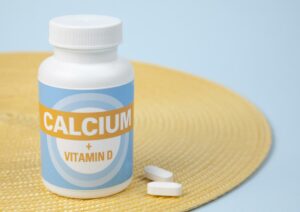Menopause is a natural biological process that marks the end of a woman’s reproductive years. While it brings relief from menstrual cycles, hot flashes, and mood swings, it also introduces new challenges, including weight gain. Many women experience weight gain during menopause, primarily due to hormonal changes, slowed metabolism, and lifestyle factors. This blog explores various Medicine for Menopause Weight Gain and considerations to consider when taking medicines.
Contents
Relationship Between Menopause and Weight Gain

Menopause and weight gain are closely linked, and many women experience changes in their body composition during this natural phase of life. Several factors contribute to weight gain during menopause, and understanding these dynamics is essential for managing one’s health effectively.
The decline in Estrogen Levels:
- Estrogen, a hormone produced by the ovaries, plays a crucial role in regulating metabolism and body fat distribution. During menopause, estrogen levels decline significantly.
- The reduction in estrogen is associated with an increased tendency to store fat, particularly around the abdomen. This change in fat distribution can contribute to weight gain.
Slower Metabolism:
- As women age, their metabolism naturally slows down. This decline in metabolic rate means that the body burns fewer calories at rest.
- A slower metabolism can make it more challenging to maintain or lose weight, especially if dietary and activity levels remain the same.
Changes in Physical Activity:
- Many women may experience a decline in physical activity levels during menopause due to factors such as fatigue, joint pain, or other menopausal symptoms.
- Reduced physical activity can contribute to weight gain by creating an imbalance between calorie intake and expenditure.
Dietary Habits:
- Menopausal women may face changes in appetite and food preferences. Some women report increased cravings for high-calorie, sugary, or comfort foods.
- Hormonal fluctuations and emotional changes during menopause can contribute to overeating or making less healthy food choices.
Loss of Muscle Mass:
- Aging and hormonal changes can lead to a gradual loss of muscle mass, a process known as sarcopenia. Muscle tissue burns more calories than fat tissue, so a decrease in muscle mass can contribute to weight gain.
- Strength training exercises can help counteract muscle loss and boost metabolism.
Emotional and Psychological Impact:
- Menopause can bring about emotional and psychological changes, including increased stress, anxiety, or mood swings.
- Emotional eating or using food as a way to cope with these changes can contribute to weight gain.
Different Medicine for Menopause Weight Gain

When it comes to addressing weight gain during menopause, various medications and supplements may be considered. It’s important to note that any decision to use medication should be made in consultation with a healthcare professional who can assess an individual’s specific health situation and provide personalized advice.
Here are some medicine for menopause weight gain:
Selective Serotonin Reuptake Inhibitors (SSRIs)
Selective Serotonin Reuptake Inhibitors, commonly known as SSRIs, are a class of medications primarily prescribed to treat mood disorders such as depression and anxiety. While they are not specifically designed to address menopausal symptoms or weight gain, some women going through menopause may be prescribed SSRIs to manage mood swings, irritability, or emotional symptoms associated with this life transition.
How SSRIs Work:
SSRIs primarily target the neurotransmitter serotonin in the brain. Serotonin is a neurotransmitter that plays a crucial role in regulating mood, emotion, and sleep. In individuals with depression and anxiety, there is often an imbalance of serotonin levels.
The mechanism of action of SSRIs involves blocking the reabsorption (reuptake) of serotonin by nerve cells. By doing so, SSRIs increase the concentration of serotonin in the synaptic cleft, the gap between nerve cells. This increased concentration of serotonin is thought to enhance communication between nerve cells and alleviate symptoms of depression and anxiety.
Common SSRIs:
Several SSRIs are commonly prescribed, each with its characteristics and potential side effects. Some of the well-known SSRIs include:
- Fluoxetine (Prozac)
- Sertraline (Zoloft)
- Paroxetine (Paxil)
- Escitalopram (Lexapro)
- Citalopram (Celexa)
- Fluvoxamine (Luvox)
Metformin
Metformin is an oral medication commonly prescribed to manage type 2 diabetes. While its primary use is in the treatment of diabetes, some studies and healthcare providers have explored its potential benefits in addressing various conditions beyond diabetes, including polycystic ovary syndrome (PCOS) and weight management. Here’s an overview of Metformin, its mechanism of action, and its potential use in the context of weight management and conditions related to menopause.
Mechanism of Action:
Metformin belongs to a class of medications called biguanides. Its primary mode of action involves:
- Insulin Sensitivity: Metformin improves the body’s sensitivity to insulin, a hormone that regulates blood sugar levels. It helps the cells respond more effectively to insulin, reducing the amount of sugar produced by the liver.
- Glucose Absorption: Metformin decreases the absorption of glucose from the intestines, helping to lower blood sugar levels after meals.
- Liver Function: Metformin inhibits the liver from producing excess glucose, which is particularly important for individuals with insulin resistance.
Calcium and Vitamin D Supplements

Calcium and vitamin D are essential nutrients that play crucial roles in maintaining overall health, particularly bone health. During menopause, women may face an increased risk of bone density loss, making supplementation with calcium and vitamin D important. Let’s explore the roles of these nutrients, their sources, and the potential benefits of calcium and vitamin D supplements during and after menopause.
Importance of Calcium and Vitamin D During Menopause:
Bone Health:
- During menopause, the decline in estrogen levels can lead to a decrease in bone density, increasing the risk of osteoporosis and fractures.
- Adequate calcium intake, along with vitamin D, is crucial for maintaining bone density and reducing the risk of osteoporosis.
Hormonal Changes:
- Estrogen helps regulate calcium absorption and utilization in the bones. As estrogen levels decrease during menopause, calcium metabolism can be affected.
Muscle Function:
- Both calcium and vitamin D are essential for proper muscle function. Adequate levels of these nutrients can help prevent muscle weakness and cramps.
Wegovy
Wegovy (semaglutide 2.4 mg) is a medication used for weight management in adults who are obese or overweight with at least one weight-related condition. It’s important to note that drug approvals, availability, and additional information may have changed since then, so it’s advisable to consult more recent sources or a healthcare professional for the latest details.
Key Points about Wegovy:
- Class of Medication: Wegovy belongs to a class of medications called glucagon-like peptide-1 receptor agonists (GLP-1 RAs). These medications primarily work by mimicking the effects of a naturally occurring hormone, glucagon-like peptide-1 (GLP-1).
- Mechanism of Action: Semaglutide, the active ingredient in Wegovy, acts on the brain to regulate appetite and reduce food intake. It also slows down the emptying of the stomach, leading to a feeling of fullness.
- Usage: Wegovy is typically prescribed for adults with a body mass index (BMI) of 30 kg/m² or greater, or for those with a BMI of 27 kg/m² or greater who have at least one weight-related condition such as high blood pressure, type 2 diabetes, or high cholesterol.
- Administration: Wegovy is administered as a subcutaneous injection (under the skin) once a week. The recommended dose is 2.4 mg per week.
- Clinical Trials: The approval of Wegovy was based on clinical trials that demonstrated its efficacy in helping patients achieve significant weight loss. Participants in these trials received lifestyle interventions in addition to Wegovy.
Considerations To Take Before Medicine for Menopause Weight Gain

Before considering medication for managing menopause-related weight gain, several important considerations should be taken into account. It’s essential to approach any treatment plan with a thorough understanding of individual health, potential risks, and benefits. Here are key considerations to discuss with your healthcare provider:
1. Comprehensive Health Assessment:
- Conduct a comprehensive health assessment with your healthcare provider to evaluate your overall health, medical history, and any existing conditions. Certain medications may interact with pre-existing health conditions or medications.
2. Underlying Causes of Weight Gain:
- Explore and address any underlying causes of weight gain during menopause. Hormonal changes, metabolism shifts, and lifestyle factors can contribute. Identifying these factors helps tailor a more targeted treatment plan.
3. Lifestyle Modifications:
- Prioritize lifestyle modifications such as a balanced diet, regular exercise, stress management, and adequate sleep. These play a crucial role in weight management and overall well-being.
4. Discussing Hormone Replacement Therapy (HRT):
- If hormonal imbalances are contributing to weight gain, discuss the potential benefits and risks of Hormone Replacement Therapy (HRT) with your healthcare provider. HRT involves replacing hormones like estrogen, which decline during menopause.
5. Medication Options:
- Understand the available medication options for menopause-related weight gain. Discuss the mechanism of action, potential side effects, and expected outcomes with your healthcare provider. Medications may include anti-obesity medications or medications with secondary effects on weight.
6. Individualized Approach:
- Recognize that responses to medications can vary among individuals. Your healthcare provider should consider your unique health profile when recommending a treatment plan.
7. Potential Side Effects:
- Be aware of potential side effects associated with medications. Discuss any concerns or pre-existing conditions that may increase the risk of adverse reactions.
Conclusion
In conclusion, addressing weight gain during menopause requires a thoughtful and individualized approach that considers a range of factors, from hormonal changes to lifestyle habits. While medications can be part of a comprehensive strategy, they should be approached with caution and under the guidance of a healthcare professional.
Understanding the complexities of menopause-related weight gain, including its hormonal, metabolic, and psychological aspects, is essential. Lifestyle modifications, such as a balanced diet, regular exercise, stress management, and sufficient sleep, play a fundamental role in achieving and maintaining a healthy weight.
If you are facing menopause-related issues, menopause treatment at HerMantra can help. Book your free trial online menopause treatment session now.


